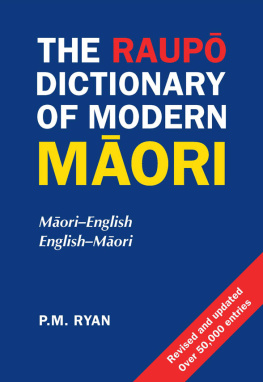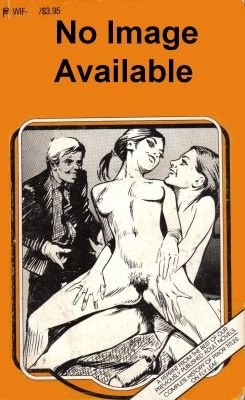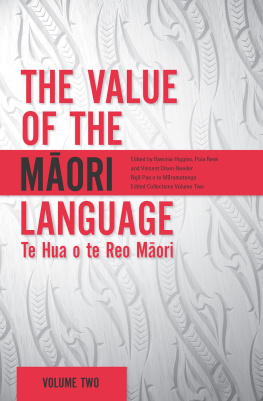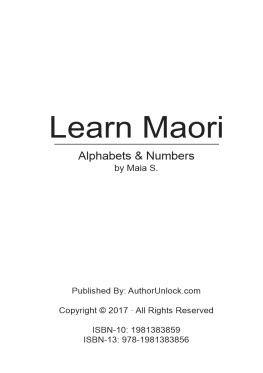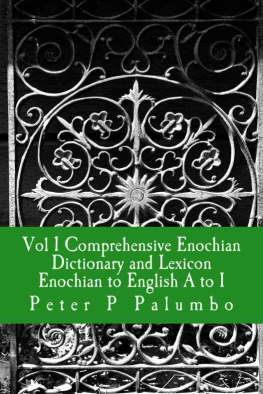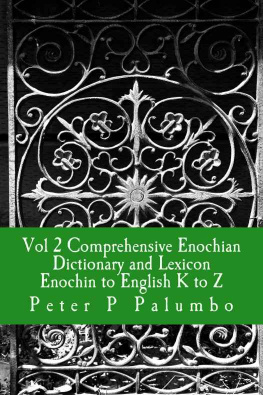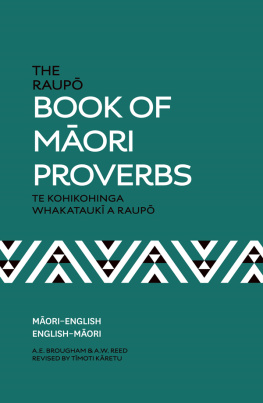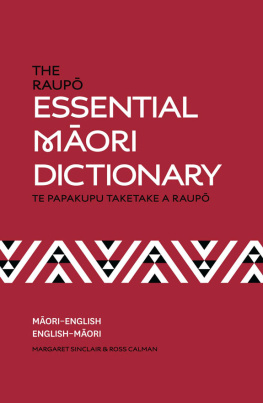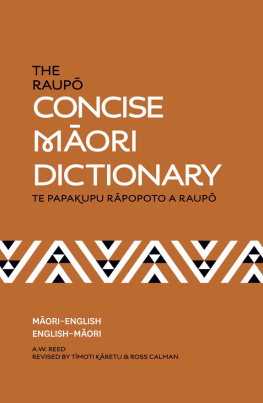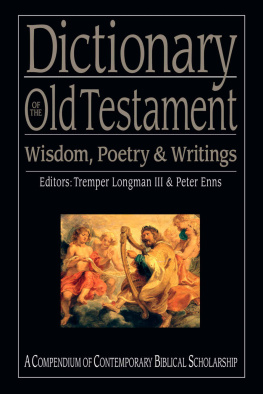Peter M. Ryan - The Raupō dictionary of modern Māori
Here you can read online Peter M. Ryan - The Raupō dictionary of modern Māori full text of the book (entire story) in english for free. Download pdf and epub, get meaning, cover and reviews about this ebook. year: 2012, publisher: Penguin Random House New Zealand, genre: Detective and thriller. Description of the work, (preface) as well as reviews are available. Best literature library LitArk.com created for fans of good reading and offers a wide selection of genres:
Romance novel
Science fiction
Adventure
Detective
Science
History
Home and family
Prose
Art
Politics
Computer
Non-fiction
Religion
Business
Children
Humor
Choose a favorite category and find really read worthwhile books. Enjoy immersion in the world of imagination, feel the emotions of the characters or learn something new for yourself, make an fascinating discovery.
- Book:The Raupō dictionary of modern Māori
- Author:
- Publisher:Penguin Random House New Zealand
- Genre:
- Year:2012
- Rating:5 / 5
- Favourites:Add to favourites
- Your mark:
- 100
- 1
- 2
- 3
- 4
- 5
The Raupō dictionary of modern Māori: summary, description and annotation
We offer to read an annotation, description, summary or preface (depends on what the author of the book "The Raupō dictionary of modern Māori" wrote himself). If you haven't found the necessary information about the book — write in the comments, we will try to find it.
The Raupō dictionary of modern Māori — read online for free the complete book (whole text) full work
Below is the text of the book, divided by pages. System saving the place of the last page read, allows you to conveniently read the book "The Raupō dictionary of modern Māori" online for free, without having to search again every time where you left off. Put a bookmark, and you can go to the page where you finished reading at any time.
Font size:
Interval:
Bookmark:

PENGUIN BOOKS
Five hundred or so new words have been added, many of these were discovered when a group of us translated the rubrics of the New Roman Missal for Catholics with its use of ritualistic words. I hope these additions will be of further use to readers and students of the Mori language. Kia kaha, kia , , kia aroha ki te reo Mori. Arohanui,n P Mikaere Ryan
Kei te tangi hotuhotu te manawa ki a rtou kua ngaro atu i te kanohi tangata. Haere e ng mate, haere ki te kinga tturu; e aruaru ana i a koutou koutou mahi pai. Ahakoa kua ngaro atu koutou kanohi, he w tonu kei te haere mai, ka tutaki an ttou i a ttou. N reira, haere, haere, haere. Of those lovely people who have now disappeared from sight I must mention the names of those who helped in the gathering and treasuring of the Mori words and meanings which you will find in this collection. Not long ago John Tapiata went to his reward, all too young! In the early seventies John was the Mori language motivator for the Education Department.
His energy and his spirit of fun will never be forgotten by those who worked with him. Haere, e hoa, haere ki te iwi nui i te p, ki ng rangatira kairahi o Ngti Ranginui me te whnau katoa, kua mene atu r ki tua o te rai. Haere, haere, haere. One day John brought David Heap, manager of Heinemann Education Books, to Hto Petera College. After introductions John brought out a little stencilled vocab booklet (68 pages laboriously typed on a micro-typewriter) which I had made for the pupils of the college. At his suggestion Heinemann took over the job of publishing it.
I was very relieved because it had already gone into a second stencil edition of 96 pages and a lot of teachers were finding it useful. Three people stand out very clearly in my early days of learning Mori: Pa Teo Wanders from Nijmegen in the Netherlands; Tamati Peita from Panguru; and Lemi Morrison from Rotorua. Pa Teo came to Aotearoa in the early thirties, and was my boss in Panguru when I arrived there in 1954. He was an acknowledged master of spoken Mori. He went to every tangi and hui in Northland and his speeches were often the highlight of the evening in the Meeting House. And he took me with him and expected me to do the same! Of course the people assured me that my stuttering efforts were perfect; as Wati Taylor once said, E Pa, khore ahau e mhio ki te tikanga o u kupu, engari he whai tikanga rawa E Pa, I dont understand a word youre saying, but I know its full of meaning.
Tamati Peita would ask me to come and sit with him on his verandah, under the shadow of Panguru--Ppata, and he would talk very clear Mori, occasionally calling to Matutina, his daughter, to bring his tokotoko so that he could struggle to his feet and give a proper Mihi. In later years some of these tauparapara would flow from my lips without any conscious effort; it was actually quite spooky. In Rotorua in the 1950s Lemi Morrison was one of the best guides anyone could have had. Among the Arawa people Mori oratory is considered a great art form, interwoven with waiata and pkeka and haka and whakatauk and all the other embellishments of the art. Lemi wanted to make sure that I didnt fall into the trap of learning those trimmings first. The core of the message had to be first priority.
N reira, e Lemi krua ko Heketangi, haere ki te w kinga i oatitia mai nei e t ttou Matua nui i te rangi. tna w ka kite an ttou i a ttou. There were many others, like Pirihira Ngarangi, the kuia who looked after the presbytery in Panguru. She wrote my very first sermon in Mori all about stealing. (Her niece Teresas guitar had recently been stolen!) In Rotorua, Keepa Ehau was very kind to me and signed over to me all the recordings of his broadcasts on 1YZ. Noema Tawio of Waitaruke, Beth Ranapia of the Kura-a-Tuhi, Arapeta Awatere in Rotorua and Auckland, Judy Haumaha of Hui Te Rangiora, Hamilton and Kngi Ihaka o te Taura Whiri i te Reo Mori, Mike Tipene me na mtua a Raiha rua ko Buck Tipene of New Lynn me te tini hoki o rtou kua whetrangitia.
Kua mutu ng mahi me ng raruraru o tnei ao m koutou. N reira, haere ki te rangimrie, haere hei karere m mtou e aru atu nei i a koutou. Haere haere haere. Kua roa rawa pea tnei kupu whakataki, engari he tikanga tnei o mua Its the ancient privilege of the Mori speaker to drag out the greetings, so that no one feels left out. So far Ive thanked those who have already left this world. There are also many who are still alive who have been very supportive in my search for words and their meanings: Auntie Martha (Rapira), Dave King, Bob Newson, Pa Henare, Pa Kereti Aarts, Pa Hemi Potatau who sat with us young ones on the lecture benches of Auckland University and who gained his degree in his 73rd year, our tutor Bob (Te Tahi) Mahuta; Winnie and Chris (McMath) and Pio Jacobs, Rua Bristowe o te Tai Rawhiti and Edie Tapara of Taranaki.
Then there is Brother Nevil of the Marist Brothers who taught me to tame this beast of the modern era called the rorohiko the computer. Many best wishes also to those unnamed heroes who toiled away to translate all those turgid government documents, iwi documents, and United Nations resolutions into clear Mori. Kia mia! Kia manawanui!
She just couldnt work out what an albatross was doing struggling in the office desk. Perhaps if you look up the word toroa you will see what the trouble was. The headwords and their meanings in this dictionary are presented as simply as possible. Endings which change the word from active to passive have generally been included in a bracket after the word, e.g. waiata(-tia) = to sing, to be sung. In Mori the distinction between nouns and verbs is not as sharp as in English.
Even a noun can have a passive ending, e.g. matapihi = window can become matapihi-tia = be windowed! So you have to use your imagination something active was done in or about the window, like climbing through it instead of entering by the door. Sometimes headwords are given the annotations n. noun, v. verb, adj. adverb, but this is only to make referral easier when one word has a lot of meanings. adverb, but this is only to make referral easier when one word has a lot of meanings.
Ive tried to include all the modern words re-introduced into the language by the Taura Whiri i te Reo Mori. Many thanks to Tini Molyneux and the reporters of Te Karere; also to the speakers on the Sunday morning Mori TV programmes who are willing to pass on to us their learning about all aspects of Moritanga. There are some words which I abhor and which are just imitations of Pkeha greetings, like mrena and ata mrie. Ill only begin to use them when I hear Pkeha people copying the Mori greeting and saying, May you have your health! for their morning greeting. I think Kia ora is a wonderful saying, its almost tapu; it echoes the words of St Paul, May you have life and have it more abundantly.
Font size:
Interval:
Bookmark:
Similar books «The Raupō dictionary of modern Māori»
Look at similar books to The Raupō dictionary of modern Māori. We have selected literature similar in name and meaning in the hope of providing readers with more options to find new, interesting, not yet read works.
Discussion, reviews of the book The Raupō dictionary of modern Māori and just readers' own opinions. Leave your comments, write what you think about the work, its meaning or the main characters. Specify what exactly you liked and what you didn't like, and why you think so.

